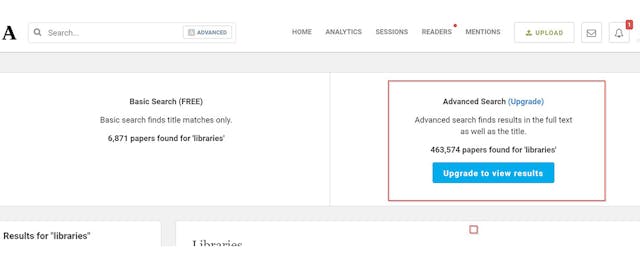When social media site Academia.edu hit the scene in 2008, it was hailed by some scholars as an alternative to pricey academic publishing and peer-review models. Professors and researchers could use the social platform to share their work, findings and ideas—most importantly, at no cost. For some users who have recently visited Academia.edu however, things are looking different.
https://t.co/YzJQD4nTon now asking $ for ability to search within full-text. This is crazy... My guess they just shot themselves in the foot pic.twitter.com/M7NFeojwiX
— Aaron Tay (@aarontay) May 1, 2017
The website has set up a paywalled “advanced search” option, accessible only through Academia.edu’s new premium subscription, which costs $9 per month or $99 per year. The feature allows paying users to find exact keyword matches within the full-text of papers on Academia. Without a subscription, the website’s search engine still retrieves articles with headlines containing the searched keywords.
While the website’s existing features—including uploading and downloading articles, peer-review sessions and recommendations—remain free, the company has received backlash for its new pricing model.
“Open access to an ocean of articles without the ability to search through them is meaningless,” a self-described academic mathematician wrote in a recent Hacker News thread started by Ben Lund, chief technology officer at Academia.edu. The discussion initiated in response to an article that appeared on Diggit Magazine by a university lecturer (and the publication's editor-in-chief) who discovered the blocked feature while searching for materials for his students.
If searching full text via search engine no longer works without paying, then https://t.co/4oINq9mfPE will indeed have become useless. https://t.co/fLnhmIxlB3
— Melanie Swalwell (@melswal) April 29, 2017
Commodification of scholarship continues. https://t.co/8H3toBl0pM now asking you to PAY to perform advanced search. https://t.co/mEiB8p9mNC
— Jennifer Bazeley (@jwbazeley) May 1, 2017
Academia.edu first introduced Academia Premium and its accompanying paid search features last December. In a blog post on Medium, the company wrote that the purpose of the subscription was to “help make all scholarship and science easily and freely accessible to everyone, not just those affiliated with well-endowed institutions.” Establishing a premium account was also part of the company’s effort to become a more “sustainable operation,” CEO Richard Price wrote in a subsequent blog post in March.
“Running any site at scale has costs and you have to figure out how to pay for that,” CEO and founder Richard Price tells EdSurge. He adds that nearly 19 million papers exist and are free on the platform, and that 40 percent of users are from from developing countries with limited access to research.
Academia Premium has yet to roll out to all users. According to Price, only a “random” selection of users are currently offered the service, which also includes alerts when a subscriber’s name is mentioned in an article, analytics to see who is reading an author’s work, and a personal website option that creates a unique URL for someone’s Academia profile.
The CEO also says premium subscription will eventually be available to all users, but is targeted for “academics themselves.”
“Our most avid users are authors, the people who are building their careers in academia,” says Price. “The premium features we have built so far are more useful to them.”
But skeptical scholars say the perks are just another way of monetizing academic information for an elite few. “The new [premium] feature is academic class politics to a new level—and it only promotes the further stratification of the academy,” Sarah Bond, an assistant professor at the University of Iowa, wrote for Forbes in January.
Critics have pointed out holes in the business plan, too. “This feature isn't going to be effective for you without some rethinking. People can simply search on Google: site:academia.edu "Potterheads" and retrieve all the results,” one user shared in the Hacker News thread.
Academia Premium isn’t the first cost to be introduced on Academia.edu, which claims 35 million people visit the site each month. Last January, the company proposed allowing authors to pay a fee that would boost article recommendations from the website’s editors. That move also garnered a slew of criticism, and the company eventually killed the idea.


